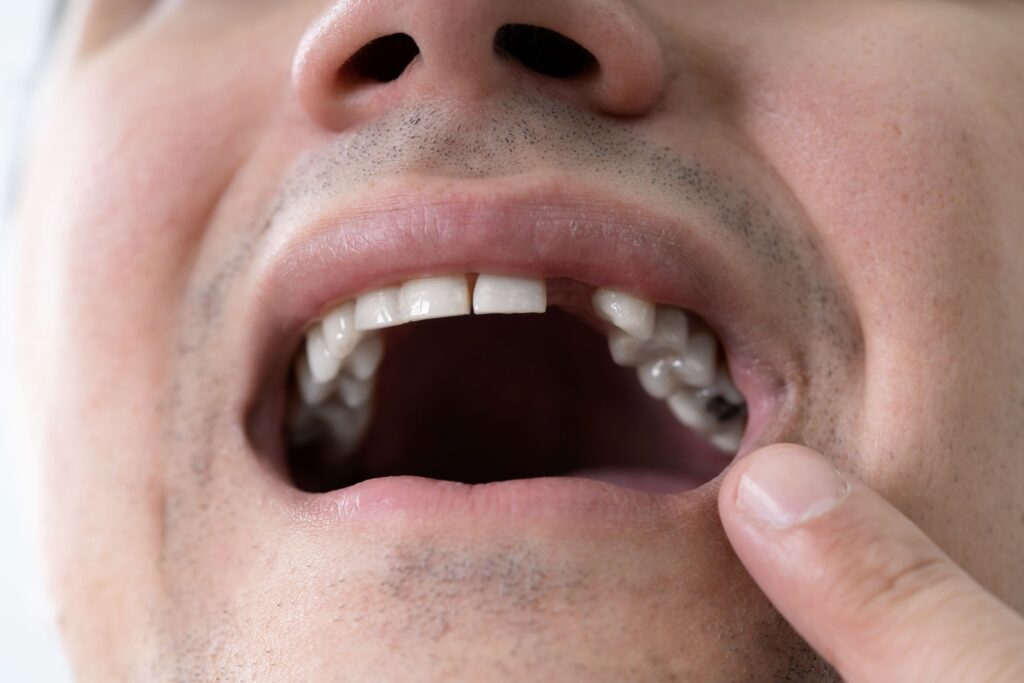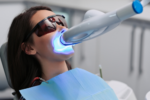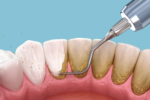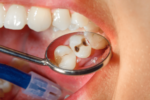A quest to save your smile from a dental emergency takes more than just understanding—it necessitates effective insight. Understanding and adopting a few simple tactics will provide you with the ability to navigate the unexpected and protect your priceless smile.
It’s also crucial that you seek out emergency dentistry near you; after all, dental professionals are experts and can properly identify the underlying causes as well as the most appropriate solution to remedy them.
Bleeding, pain, lost or broken dental prosthetics, and a dislodged tooth are common events that may demand immediate care.
How to Handle a Knocked-Out Tooth
A knocked-out tooth, also known as an avulsed tooth, demands prompt and informed action to maximize the chances of saving it. Follow these detailed steps for a comprehensive approach:
- Immediate Response (Within 5 Minutes)
Time is of the essence. Retrieve the tooth by holding the crown (top) and avoiding touching the roots. Rinse it gently with milk or a saline solution if it is dirty, but never use water. - Keep It Moist
The tooth needs moisture to survive. If at all feasible, try to put the tooth back into its socket. Or perhaps place it in a receptacle containing saliva, milk, or tooth sealant. Don’t immerse it in water. - Contact Your Emergency Dentist
Act swiftly. Call your emergency dentist immediately. Provide clear details about the incident and follow their guidance for the next steps. - Handling the Tooth En Route
If you’re on the way to the dentist, hold the tooth in your mouth between your cheeks and gums, ensuring it stays moist. Alternatively, transport it in a container with milk. - Immediate Dental Care (Within 30 Minutes)
The golden window for re-implantation is within 30 minutes. Your dentist will assess the tooth, clean it, and attempt to reinsert it into the socket. They may splint it to adjacent teeth for stability. - X-rays and Follow-Up
X-rays will be taken to assess the positioning of the reinserted tooth. Follow-up appointments are crucial for monitoring the tooth’s progress and ensuring proper healing. - Pain Management and Antibiotics
Antibiotics and painkillers may be prescribed by your dentist in order to treat infections. Carefully adhere to their directions to ensure a speedy recovery. - Long-Term Monitoring
Regular check-ups are essential to monitor the reinserted tooth’s stability and overall oral health. Your dentist will guide you through long-term care and potential restorative treatments.
Don’t panic if you find yourself in need of emergency dentistry in Edmonton. Take a deep breath, and then visit a nearby clinic.
Seeking Emergency Dental Care
Dental emergencies are stressful, but with quick and proficient action, they can easily be remedied. The measures noted below can help you navigate this process:
Contacting Your Dental Provider
Maintaining constant contact with a dentist near you is critical. They’ll recommend care that will be tailored to your requirements, which, in turn, will ensure that your outcomes are successful and any discomfort is eliminated.
Recounting the Details of Your Situation
When communicating with your emergency dentist, make sure you carefully express the following:
- Define the problem: Please specify whether you are experiencing acute pain, bleeding, a broken tooth, or any other type of emergency.
Describe the level of discomfort you’re experiencing as light, moderate, or severe. - Any (visible) damage: Report a tooth or surrounding damage.
- Your dental/medical history: Please provide a brief summary of any pertinent dental history or current treatments.
Being Receptive to Your Dentist’s Advice
Your emergency dentist may relieve pain or protect the area. It is very crucial that you adhere to any instructions they provide, as such tactics will ensure that your smile makes a full recovery. That said, common steps that may be mentioned can include:
- Rinsing with warm water: To clean your mouth, gently rinse it with warm water. Observe your dentist’s instructions if they recommend over-the-counter medications.
- Watch what you eat: Avoid hard, hot, or cold meals that could worsen your situation.
- Reach out for help: Should you continue to experience any negative consequences or have any problems, give your dentist a call. They may have you come in for more frequent check-ups to ensure that all is well regarding the function and appearance of your smile.
Preventing Emergencies
Protecting your teeth from oral trauma is much simpler than you think; the best strategies stem from common sense and listening to your dental team. Wearing a mouthguard or night guard while playing sports or if you’re dealing with bruxism can prevent cracks, chips, and enamel erosion. Being mindful of your diet, drinking lots of water, and not using your teeth to open packages will also help stop any damage.
Preserve Your Smile at Belle Rive Dental Clinic
Your smile matters. Belle Rive Dental Clinic is prepared to respond to dental emergencies, whether your tooth’s been dislodged from its socket, your gums are bleeding, or you have tissue lacerations.
Make an appointment as soon as possible to allow our compassionate staff to assist you in achieving vibrant and restored oral health.
FAQ:
- What are the chances of saving a knocked-out tooth?
Time is crucial! Act swiftly—replant the tooth within 30 minutes, either back in the socket or in milk. This boosts the odds of saving the tooth. Rush to your dentist for immediate care. - Can a tooth that has been out of its socket for a long time still be saved by a dentist?
While time has a role, not everything is lost. Take action within a few hours, avoid drying out the tooth, and see a dentist right away. They will evaluate the circumstances and work to save the tooth. - How can I prevent my child from knocking out their teeth during play?
Safeguard those smiles! Equip your child with mouthguards for sports. Keep a watchful eye during play to steer clear of rough activities. Take time to talk to your child about the importance of dental care to ensure a healthy and happy smile.








